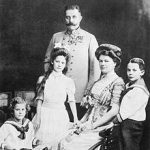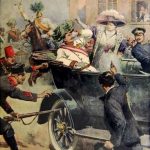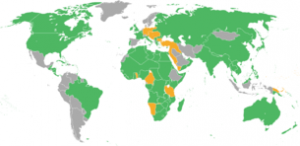bosnia

 It’s amazing to me that one act of hate can bring so many people to war, but that was what happened with World War I. On June 28, 1914, Archduke Franz Ferdinand of Austria, and his wife, Sophie, Duchess of Hohenberg, were assassinated by a Serbian nationalist in Sarajevo, Bosnia. The assassin, Gavrilo Princip was an ethnic Serb and Yugoslav nationalist from the group Young Bosnia, which was supported by the Black Hand, a nationalist organization in Serbia. The outraged Austrian people and its government threatened mobilization of troops to seek vengeance for their beloved leader and his family.
It’s amazing to me that one act of hate can bring so many people to war, but that was what happened with World War I. On June 28, 1914, Archduke Franz Ferdinand of Austria, and his wife, Sophie, Duchess of Hohenberg, were assassinated by a Serbian nationalist in Sarajevo, Bosnia. The assassin, Gavrilo Princip was an ethnic Serb and Yugoslav nationalist from the group Young Bosnia, which was supported by the Black Hand, a nationalist organization in Serbia. The outraged Austrian people and its government threatened mobilization of troops to seek vengeance for their beloved leader and his family.
The crisis escalated as the conflict between Austria-Hungary and Serbia came to involve Russia, Germany, France, and ultimately Belgium and Great Britain. By mid-August of 1914, the crisis had become a full blown war, with Germany, Austria Hungary and the Ottoman Empire, known as the Central Powers, against Great Britain, France, Russia, Italy and Japan, the Allied Powers. The United States would also enter the war as a part of the Allied Powers in 1917. Other factors came into play during the diplomatic crisis that preceded the war, such as misperceptions of intent in that Germany believed that Britain would remain neutral, the belief that war was inevitable, and the speed of the crisis, which was exacerbated by delays and misunderstandings in diplomatic communications. The four years of the Great War…as it was dubbed…saw unprecedented levels of carnage and destruction, thanks to grueling trench warfare and the introduction of modern weaponry such as machine guns, tanks and chemical weapons. By the time World War I ended in the defeat of the Central Powers in November 1918, more than 9 million soldiers had been killed and 21 million more wounded.
Evil exists in this world, and it gets worse every day, and assassinations are not new. Chanakya, 350–283 BC, an Indian teacher, philosopher and royal advisor, wrote about assassinations in detail in his political treatise Arthashastra. Later, his student Chandragupta Maurya, the founder of the Maurya Empire of India, made use of assassinations against some of his enemies, including two of Alexander’s generals Nicanor and Philip. I suppose it should not be a surprise, yet every assassination brings with it shock, fear, and rage. 
 Countless wars have been fought over one nation’s ruler being killed by someone from another nation. War will be a part of our world until the end of time, but that in no way lessens the worry, fear, and sadness that war always brings. Still, like the Allies of World War I, we cannot let one group or nation hold power over another group or nation…which also explains the need to destroy ISIS.
Countless wars have been fought over one nation’s ruler being killed by someone from another nation. War will be a part of our world until the end of time, but that in no way lessens the worry, fear, and sadness that war always brings. Still, like the Allies of World War I, we cannot let one group or nation hold power over another group or nation…which also explains the need to destroy ISIS.

